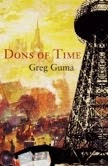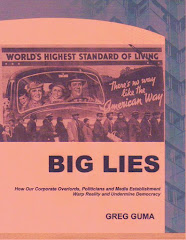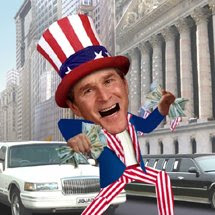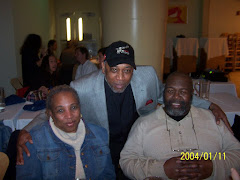The shift from liberty to conformity in the early twentieth century was exemplified by Babbitt, archetypal main character in Sinclair Lewis' 1922 novel of the same name. This so-called rational man lacked individuality in himself, and both feared and suspected it in others. The "village virus" which afflicted the middle-American realtor George Babbitt was society's increased standardization, its cultural and spiritual apathy. Rapid industrialization was shaping society’s go-getters, and Babbitt was a shattering early literary portrait of this new breed, the organization man.
The advocacy in Lewis' fiction rested not so much on his reporting of 1920s mechanization of thought, but on his use of status items to sting the materialism and monotony of small-town life. Babbitt's home was Zenith, a wonder-city topped by misty towers, where cars bred faster than men, where buying and selling had become societal ends, where size and number were the exclusive social yardsticks. In Zenith, the soul was replaced by gadgets which anyone who worked hard enough could obtain. The religion of this dystopia was success, its morality profit gained through conforming service. The managers of Zenith sought only efficiency in the production of wealth and comfort, and George Babbitt was surely one of the boys.
As Lewis saw it, the opportunist salesman was a victim of class pressure, submitting to belief in the need for standardization both in patterns of living and opinions. During a speech at a real estate brokers' convention, Babbitt defined the "standardized American citizen," a "lover of the Little Ones, a supporter of the hearthstone." He was part of a group of "regular guys," men with "hair on their chests and smiles in their eyes and adding machines in their offices."
Babbitt was reasonable but devoid of self-knowledge. He had found security in the groups that defined his philosophy and framed his actions – service clubs, lodges, the Chamber of Commerce. He thought in terms of "projects" and "operations," innocent of ideas. An enemy of art and intuition, he revered gadgets, manufacturing and money. When his daughter explained her idealistic desire to work in a settlement house, he replied hotly, "The first thing you got to understand is that all this uplift and flipflop and settlement-work and recreation is nothing in God's world but the entering wedge of socialism. The sooner a man learns he isn't going to be coddled, and he needn't expect a lot of free grub and, uh, all these free classes and flipflop and doodads for his kids unless he earns 'em, why, the sooner he'll get on the job and produce - produce - produce! That's what the country needs...."
Both humanism and higher education, said Babbitt, were distracting the country from its higher purpose: the efficient production of more goods and services. Needed is not a college president or "monkeying with foreign affairs, but a good-sound-economical-business-administration." A rational approach to societal management could make it what Babbitt desired -- big. "And Babbitt respected bigness in anything; in mountains, jewels, muscles, wealth or words."
The standardized, routinized, predictable and productive world that George Babbitt admired made demands of every citizen. He welcomed such sacrifices, belittling those who resisted the choice. "It stands to reason,” he said, “a man who doesn't buckle down and do his duty, even if it does bore him sometimes, is nothing but a -- well, he's simply a weakling. Mollycoddle, in fact."
Ironically, the elite titan of industry was gradually becoming an enemy of efficient order, replaced by Babbitt the "rhinoceros," who devoted himself to the "cosmic purpose of Selling -- not of selling anything in particular, for or to anybody in particular, but pure Selling." What Babbitt sold was ultimately himself, conditioned to the demands of his standardized society. In Main Street, histologist Kurt Yavitch explained his (and Lewis') opposition to Zenith and the many Babbitts around him: "What I fight in Zenith is standardization of thought, and, of course, the traditions of competition. The real villains of the piece are the clean, kind, industrious Family Men who use every known brand of trickery and cruelty to insure the prosperity of their cubs."
Yavitch called himself a revolutionist. "I know exactly what I want," he said. The trouble with Babbitt, he argued, was his dependence upon others to define what he wanted, his empty practicality and his frightened rejection of the dying spirit within him. By the 1920s, however, most Americans wanted "normalcy" and money, and the literary warnings of idealistic or cynical advocates didn’t dissuade either the public or its managers.
In a history of the nation written just after the great 1929 crash, James Truslow Adams explained, "We had got tired of idealism and had been urged to place our destinies in the hands of the safe realists, hard-headed businessmen who would stand no nonsense about moral issues, about which we were told we had had enough, and who would be practical ....Long ago we noted the beginning of the confusion in the American mind between business and virtue. That confusion by 1930 had gone full circle. By then it had become complete. If what was economically right was also morally right, we could surrender our souls to professors of economics and captains of industry."
Ideals were sacrificed for prosperity under the practical guidance of rational managers. "By 1930 our post-war decade and our post-war prosperity were over," reported Adams. He added a hope that "our post-war materialism may also pass.”
What came next, unfortunately, was backroom politics, multinational corporations and corrupted unions, special-interest capitalism, data mining and media politics, growth-mania and technological escalation, high-speed transportation and the "rational collectives" of government, business, and education. Elite competitors and organization men worked hand-in-hand during most of this time to perfect "the system." Advocacy journalists and speculative writers meanwhile continued to expose and resist the warped vision they imposed.
Part Four of “In the 60s: Education of an Outsider.”
Next: College before the Revolution































No comments:
Post a Comment